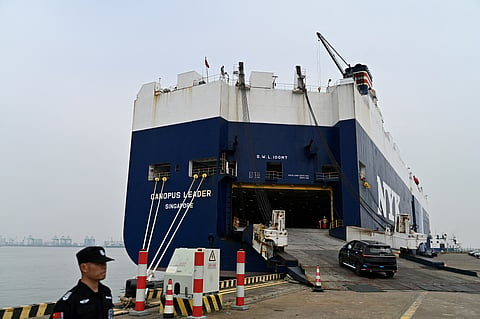
- NEWS
- the EDIT
- COMMENTARY
- BUSINESS
- LIFE
- SHOW
- ACTION
- GLOBAL GOALS
- SNAPS
- DYARYO TIRADA
- MORE

The United States announced new port fees Thursday targeting Chinese-built and operated ships, aiming to strengthen the domestic shipbuilding industry and curb China's dominance in the sector.
The move follows a probe initiated during the previous administration and is part of ongoing tensions in the trade war between the U.S. and China, which intensified under President Donald Trump’s tariffs.
"Ships and shipping are vital to American economic security and the free flow of commerce," said U.S. Trade Representative Jamieson Greer, noting that the fees will begin in mid-October.
Under the new regulation, fees will be charged based on tonnage or container load for each Chinese-linked ship making U.S. voyages, but only up to five times per year. The fees can be waived if the owner orders a U.S.-built vessel. The fees will also increase over time.
For Chinese-built ships, the fee starts at $18 per net ton (NT) or $120 per container, which could amount to as much as $1.8 million for a ship carrying 15,000 containers.
There will be distinct fees for Chinese-operated and Chinese-built ships. The U.S. shipbuilding industry, once dominant after World War II, now makes up just 0.1 percent of global output, with China leading the world in shipbuilding, followed by South Korea and Japan.
In addition to the port fees, the U.S. is also imposing new tariffs on Chinese ship-to-shore cranes and cargo handling equipment. Separate fees for non-U.S.-built car carriers and liquefied natural gas (LNG) carriers will take effect in the coming months and years, respectively.
The announcement has sparked concerns among U.S. industry groups about potential price increases for imported goods. The new fees will not apply to shipping on the Great Lakes or in the Caribbean, nor will they affect shipments to U.S. territories or bulk commodity exports on ships arriving empty.
Greer emphasized that the new fees and tariffs are designed to reverse China’s dominance in global shipping and bolster U.S. supply chain security.
